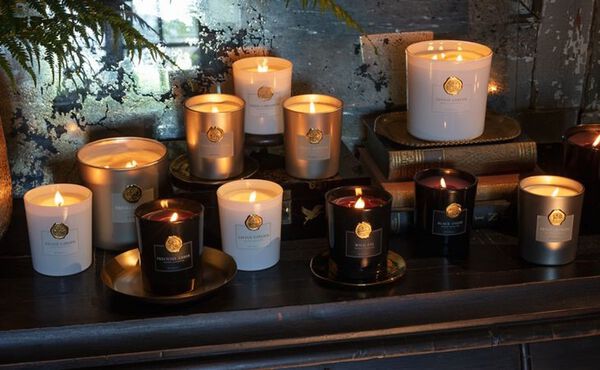Clever lighting tweaks will instantly create the cosiness factor we all crave in our homes. And it’s super easy to do. We asked the experts how to get it just right.
Cosy sofas and tactile cushions are, of course, a huge part of making a house feel cosier but if you’re struggling to make your rooms feel as snug as possible, it might be the lighting that’s lacking. Because, as the interiors and design experts will tell you, having just one light on the ceiling does not an ambience make.
By playing with different types of light sources, and varying the angles, intensities and directions you can make even the starkest room suddenly feel more inviting. That’s why we asked some experts for their top lighting tips so we can all feel as comfortable and cosy in our homes as possible.
1. Know what you’re working with
“Lighting in a room needs to be made up of three layers: ambient, task and accent,” explains Katie Thomas, interior designer and founder of KTM design. “Your main light source is known as ambient lighting and is the foundation for your lighting scheme. Task lighting illuminates the areas where your main lights don’t reach, like a desk or table lamp. Last, we have accent lighting, which can be used to draw attention to a certain area, like downlights above a painting.”
And there’s a really good reason to stick to this rule. “If you only have ambient lighting coming from the ceiling that’s when rooms start to feel quite clinical,” says Head of Interiors at Apt London, Stephane Piazza. “Combining a variety of light sources from different heights and directions is then when a room starts to feel cosy.”
2. Layer your lighting
Now it’s time to start layering up. “Approaching your lighting in a layered manner will create little pockets and pools of light, giving a welcoming atmosphere,” explains Marketa Rypacek, managing director of lighting specialists Industville. And the output of each layer is important too. “Your accent lighting should typically be three times stronger than your ambient lighting, allowing your ambient lighting to spread a uniform light across the room and the accent lighting up specific areas within that,” explains interior designer Deborah Fitz.
3. One bulb is best
“Always stick to the same bulb type and temperature,” advises Deborah. So, opt for all cool or all warm lighting throughout. That way, even though the intensities will vary to create light and dark areas throughout the space, there will also be a sense of coherence and coordination in the room.
4. Work with the space
Adjust your lighting to compliment your space. If you have high ceilings, this is perfect for adding a pendant light to add some personality to the room. With smaller spaces, try illuminating corners with lamps or candles to let the light fill that area. “Make dark corners inviting by adding a floor lamp," suggests Katie “Accent lighting is also crucial in setting the tone. Think flickering candlelight, or the crackle of a fire. If you don’t have a fireplace and you don’t want to light candles, you can recreate this with fairy lights and electric candles that add a warm, cheerful glow to dim days and long nights.”

5. Remember darkness too
Having areas well-lit so that they become functional for things like reading, working or simply being able to see what you're doing is important, but playing with the darkness is also key for creating that cosy feeling. “If you have a particular work of art or piece of furniture then it’s great to put an accent light on it so it becomes a feature of the room,” says Piazza. “What that also does is create a slightly darker and dimmer area around it and that creates instant cosiness. The darkness is equally as important as the light areas of a room and might be where you choose to put a comfortable piece of furniture to then sit enjoy looking at the areas you’ve highlighted.”
6. Discover the dimmer switch
Dimmer switches are the perfect way to control the mood and intensity of your lighting. From day to evening and season to season, the amount of natural light varies. Sometimes you need all the lights on just to see properly whereas, on sunny days, you may not need any on at all. A dimmer switch is a “quick and cost-effective way of offering multiple lighting levels in a space, allowing you to set the tone and change the atmosphere of a room instantly,” notes Marketa.
7. Switch up your lampshade
Just like a bulb, the lampshade can make a big difference to ambience. “Lampshades diffuse or redirect the light for maximum effectiveness and protect your eyes from the glare of the bulbs,” says Ash Read, founder of Living Cozy. “With this in mind, opt for a light-coloured lampshade as it will diffuse the light more easily. The shape is also important, a wide drum will overpower a smaller space, but will light up a large room.”
Choosing a texture such as rattan for your shade will cast a lovely shadow across the room. “Embrace the seasons and go for green tones which match the evergreens outside, and give off a richer and cosier light, perfect for relaxing,” suggests Katie. This is an easy and super effective way to add some mood to a room.
8. Don’t be restricted
There can be some logistical issues that come with sorting out your lighting, especially if you don't have a power supply or electrics where you need them. Particularly relevant if you rent your property and aren’t allowed to change anything fundamental or you simply don’t fancy the cost and hassle of having to do electrics. So, what do you do then? “Look for moveable lamps or rechargeable lightbulbs,” advises Fitz. “You can get some really nice options now and they’re ideal for lighting areas where you have no plugs and also add to the decor too.”
9. Extend the light
If you are lucky enough to have some outside area, extend the mood lighting into the outdoors. Try adding solar-powered string lights and downlights in your garden or balcony. Not only does this create a lovely vibe when you’re outside, but looking out to this through a window can also create a cosy feeling indoors.
This article is part of our House of Wellbeing series to help make your home a haven of wellbeing. Articles packed with expert information and practical tips designed to equip you with everything you need to know to bring serenity, calm and joy into your home.



.jpg?sw=600&sh=370&sm=fit&cx=0&cy=0&cw=600&ch=370&sfrm=jpg)



